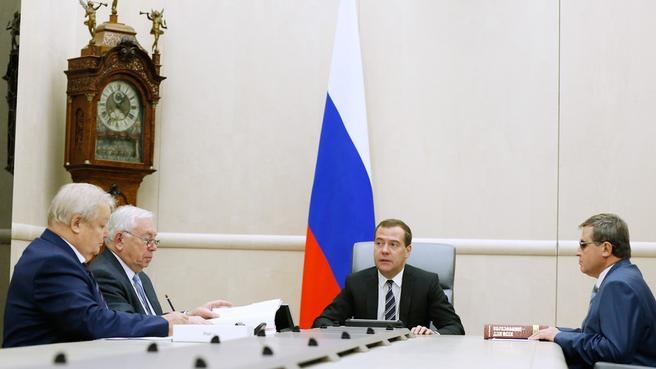Dmitry Medvedev meets with Vladimir Lukin, Oleg Smolin and Vladimir Tikhomirov.
Dmitry Medvedev met with Vladimir Lukin, president of the Russian Paralympic Committee; Oleg Smolin, vice-president of the Russian Paralympic Committee and first deputy chairman of the State Duma Education Committee; and Vladimir Tikhomirov, research supervisor of the Moscow State University of Economics, Statistics and Information, and expert committee chairman at the State Duma Committee for Education Information Technology.
From the transcript:
Dmitry Medvedev: We previously agreed to meet and discuss some developmental issues of Paralympic sport. The issues include more than the provisions for athlete training – we have upgraded these facilities recently, to an extent. What matters most now is to involve as many people with disabilities as possible in the fitness drive and in athletics, and to open sport clubs, gyms and stadiums to them. There are 13 million such people in Russia, so this is one of our national priorities.
The number of disabled athletes has more than doubled in five years from 224,000 to over half a million, as of January 1. We must do what we can to encourage this number to grow by at least fivefold by 2020. That is the goal of a state programme being implemented, of strategies to develop fitness and sports, and naturally the Barrier-Free Environment programme.
Dmitry Medvedev: "What matters most now is to involve as many people with disabilities as possible in the fitness drive and in athletics, and to open sport clubs, gyms and stadiums to them. There are 13 million such people in Russia, so this is one of our national priorities."
Vladimir Lukin: We really have something to take pride in – we started the Paralympic movement from scratch 15 years ago, and now it has received deserved recognition in Russia and the world, as we saw in Sochi.
National leadership has addressed this issue very seriously and played a prominent part in the cause. 2006 was a turning point as the Russian team performed well in Turin and made the world take notice. Progress was made in this humanitarian problem thanks to the teamwork of the entire community, the Paralympic Committee as a public organisation, and the state.
Dmitry Medvedev: It is extremely important that our people have grown accustomed to pulling for Paralympic athletes because this requires a culture all its own. Everyone has grown to realise that this sport is no less dramatic and exciting than the Olympics, and physically challenged athletes need tremendous courage and deserve admiration.
Vladimir Lukin: Paralympic sport matters to the entire community, not only to the physically challenged athletes themselves.
Dmitry Medvedev: Regrettably, our country
is, for reasons we understand, not very tolerant and is not determined to
integrate physically challenged people into the common environment, so
Paralympic sport has a tremendous educational value.












